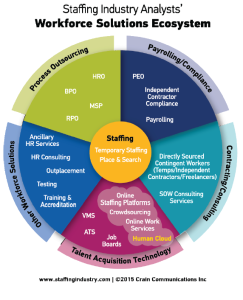What is the Staffing Industry? It seems like a simple enough question on the face of it, but the staffing industry is quite amorphous and constantly shifting, especially when we look at it on a global basis and take into account some of the new business models that have evolved in recent years.
Ten years ago, the staffing industry was a rather simpler concept. A typical staffing firm provided temporary and contract workers and maybe did some direct hire as well. We always included search and selection within our definition of staffing as well (although some of the head hunters didn’t appreciate being categorized alongside what they perceived as the more downmarket providers of temporary and contract workers).
Today, the march of technology and increasing service sophistication demanded by customers means that there are a number of peripheral services — sometimes offered as part of the service portfolio of a staffing firm and sometimes offered by independent vendors. So, the question is, if a staffing firm provides services such as MSP or RPO, is that “staffing” or is it something else? Likewise, if a staffing firm owns a job board (and a number do) or invests in one of the growing online staffing platforms (and a number do) are those revenue streams “staffing” or are they something else?
Global complications. To make this issue even more challenging, the global perspective creates another level of complexity. Due to the legislative environment in which they operate, most Latin American staffing firms provide temporary staffing as part of quasi-outsourcing arrangements; indeed; temporary staffing is actually called outsourcing (or “tercerización”) in the region.
US staffing firms looking to expand abroad should not expect that the Anglo- Saxon perspective of what a staffing firm does is necessarily relevant in every country. And it’s not just in Latin America that they will run into variations on the more familiar staffing model — the other important market where staffing firms look and act quite differently is China. Chinese staffing firms (or dispatch firms, to use the correct Asian terminology) will often provide a whole raft of HR-related services that go way beyond the rather vanilla payroll provisioning undertaken by some US staffing firms, such as office leasing, employee entertainment/motivation, labor dispute consulting and immigration services. What is interesting is that, given the way staffing services are evolving to cater for clients’ broader talent management requirements, the Chinese model is looking rather more fit-for-purpose for the modern age than the Anglo-Saxon one.
Workforce Solutions Ecosystem. Last year, in an effort to try to make sense of this evolving landscape, Staffing Industry Analysts created the Workforce Solutions Ecosystem, which, while it has the staffing industry at its heart, includes five complementary industry sectors (each of which supports a number of sub-segments): Process Outsourcing, Payrolling/Compliance, Contracting/Consulting, Talent Acquisition Technology, and Other Workforce Solutions. (We realize that placing the staffing industry at the core of this Ecosystem will appear to be a somewhat biased perspective if the center of your particular universe lies elsewhere.) Some of the sub-segments within the Ecosystem seem more naturally related to the staffing industry than others. For example, outplacement is a complementary service offered by a number of large staffing firms while training might seem rather unrelated (unless you have to provide it to temporary workers as a legal obligation, such as in some continental European markets).
Some firms perceive that bundling these various service categories within the Ecosystem is quite natural while others will view them as uncomplementary or non-core. The Japanese juggernaut, Recruit, as well as being the fifth-largest staffing firm in the world also happens to be the world’s largest job board through its ownership of Indeed and a number of Asian job boards. In the UK, Capita uniquely takes a view that outsourcing and staffing can cohabit comfortably within the same brand portfolio.
The Human Cloud. An interesting part of the Ecosystem is the Human Cloud (defined as a sub-segment of the Talent Acquisition Technology Industry). Online staffing platforms like Upwork are finding a lot of traction as are crowdsourcing firms like Crowdflower. Within the online work services category, the most prominent brand is Uber which amply demonstrates how traditional business models are at threat from disintermediation. Not surprisingly, some of the big international staffing firms have begun to make selective acquisitions in this space.
So there’s a rich variation in what might properly constitute a staffing firm and it would be foolish to be overly prescriptive in trying to define one today.
While we’re confident that the Workforce Solutions Ecosystem provides a good representation of the market as it exists today, we’re equally confident that it will need reviewing and updating on a regular basis. Improvements in technology combined with economic and demographic trends means that the ecosystem is undergoing a period of turbulent change presenting firms with threats on multiple fronts but also new opportunities to improve performance and competitiveness. Just as in a naturally evolving ecosystem, in a business ecosystem the companies that are most adaptable to change, and not necessarily the strongest, will flourish. z








